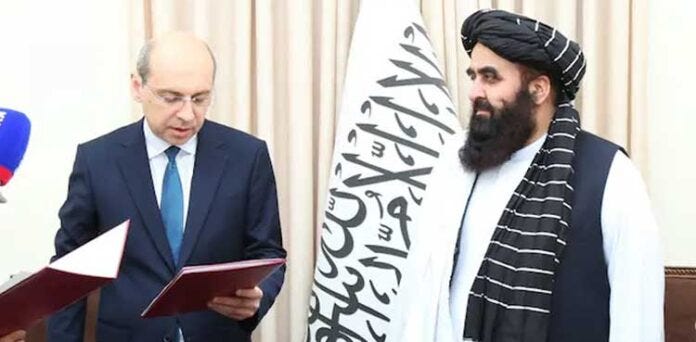Russia's Diplomatic Recognition Takes Kabul Nowhere
Recognition driven by security concerns
By: Salman Rafi Sheikh
As millions of Afghans struggle with chronic food insecurity and millions more refugees get pushed out of Pakistan and Iran into overcrowded, under-resourced camps around Kabul, the Taliban government has scored a symbolic diplomatic win: formal diplomatic recognition on July 3 from Russia. But for ordinary Afghans, the move offers little relief, as routine life in the country remains mostly paralyzed.
Reports indicate that government services remain infested with corruption and red tape, with basic administrative processes mired in inefficiency. Women and ethnic minorities remain systematically excluded from public life, with little to no recourse. But despite these deep-rooted issues, Afghanistan’s domestic turmoil is largely irrelevant to the strategic interests shaping regional diplomacy. Russia’s recognition, for instance, is driven less by endorsement of Taliban rule and ignorance of its human rights abuses than by security concerns.
Moscow is primarily focused on preventing the resurgence of transnational Islamist militant groups operating out of Afghanistan. Russia fears that these groups could destabilize Central Asia or launch attacks within Russian territory. In that context, establishing formal ties with the Taliban is a tactical move aimed at managing regional security, not supporting governance reform or human rights.
For the Taliban, this recognition is politically useful but substantively limited. It allows Kabul to claim progress on the international stage and to suggest a growing acceptance of its rule. But beyond optics, it is unlikely to unlock broader diplomatic legitimacy, particularly from Western powers. Despite informal channels with countries like China and now formal recognition from Russia, the Taliban remains diplomatically isolated.
This ongoing isolation contrasts sharply with the recent normalization of relations between Gulf monarchies and Syria, where the Islamist leader Ahmad al-Sharra, once aligned with al-Qaeda in Iraq, has been welcomed back into regional diplomacy. Most notably, the Trump administration recently lifted sanctions and opened channels of engagement with the Syrian regime. There is little denying that Trump’s decision is mainly motivated by a desire to blunt China and Russia’s growing influence in the Middle East, but there is a lot more to the Syrian question than meets the eye, especially for Afghanistan. The White House statement, in fact, dropped a hint: “The world should take notice—if you want to take meaningful steps towards peace and stability, then the United States is willing to move rapidly to support you”.
However, as far as the Taliban regime is concerned, it has remained largely resistant to transforming into a political structure that accommodates public participation or pluralism. While Taliban officials have occasionally met with international envoys, there has been no significant shift toward open governance. Notably, the group’s supreme leader, Hibatullah Akhundzada, remains almost entirely absent from public view. In fact, he has not engaged publicly with either Afghan citizens or international actors in any meaningful way since 2021.
Simultaneously, the Taliban-led government has faced ongoing accusations from Pakistan of harboring and enabling the Tehrik-i-Taliban Pakistan (TTP), a militant group responsible for numerous cross-border attacks. Despite repeated denials from Kabul, the Pakistan military continues to assert that TTP operatives are launching assaults from Afghan territory. In January 2024, a suicide bombing in Pakistan’s Khyber Pakhtunkhwa province was linked by Pakistani officials to TTP cells operating with impunity in Afghanistan, a charge the Taliban has neither fully denied nor taken visible steps to investigate.
The Taliban's domestic policies have also drawn sharp international criticism. Women and girls have been systematically excluded from secondary and higher education since the regime’s takeover. In March 2022, just hours after schools were set to reopen for girls above grade six, the Taliban reversed its decision, prompting condemnation from countries and international bodies including the United Nations and the European Union. As of mid-2025, these restrictions remain in place. UN reports that 80 percent of young Afghan women remain excluded from education, job, and professional training.
The interviews I conducted with dozens of Afghan refugees now residing in Pakistan since the Taliban's return to power reveal a consistent narrative: fear of persecution, particularly among women and ethnic minorities. Many of the women I interviewed expressed deep concern over being forcibly repatriated to Afghanistan, citing threats of violence and the lack of basic freedoms. Several individuals, including ethnic Tajiks and Uzbeks, reported losing family members in Taliban-led operations. Their preference, almost unanimously, is resettlement in Western countries, a prospect that appears increasingly bleak.
The US remains cautious in its approach. Although the Biden administration lifted the travel ban on several Muslim-majority countries in early 2021, an order initially enacted under President Donald Trump, the refugee intake from Afghanistan remains limited. Data from the US State Department shows a steep decline in Afghan refugee admissions in 2024, with priority now often given to those who had worked directly with American forces or organizations. Whether taking them in is possible or not due to the Trump administration’s travel ban on Afghanistan is not clear.
Comparisons with Syria offer a stark contrast. Ahmad al-Sharra has actively engaged with both domestic constituents and foreign diplomats. Unlike Akhundzada, al-Sharra appears publicly, often in Western dress, and has reportedly met delegations that include local women representatives. In contrast to the Taliban's blanket ban on women's education, women in Syria are allowed to attend university and participate in public life, albeit within certain restrictions. For instance, the regime recently allowed women to access public beaches, although they are required to wear “burkinis,” a particular type of swimwear.
In early 2025, the regime, after facing public protest on social media, allowed bars to operate in Damascus. While Syria continues to face accusations of human rights abuses and persecution of minorities, including the Druze and Alawite communities, the regime has also been far more responsive to international pressure for protecting minorities and executing ceasefire than the Taliban.
Among the Afghan refugees interviewed in Pakistan, fears of ethnic persecution are widespread. Ethnic Pashtuns, while not immune to Taliban oppression, are often perceived to be at less risk than minority groups. Tajiks and Uzbeks, in particular, spoke of systemic targeting and fear returning to what they describe as a “Pashtun-dominated” governance model under the Taliban.
There is yet no indication of the Taliban regime undergoing any meaningful transformation. In the end, Russia’s recognition of the Taliban regime is far from a turning point for Afghanistan. While the Taliban leverages symbolic diplomatic wins to claim legitimacy, its failure to institute even the most basic reforms—whether in governance, human rights, or regional cooperation—cements its isolation and deepens the suffering of its people. Unlike Syria’s regime, which has at least gestured toward international norms to regain regional acceptance, the Taliban has shown little willingness to evolve beyond a rigid, exclusionary ideology. Until Afghanistan's rulers engage meaningfully with both their citizens and the global community, recognition from foreign powers—however strategic—will remain hollow.
Dr Salman Rafi Sheikh is an Assistant Professor of Politics at the Lahore University of Management Sciences (LUMS) in Pakistan. He is a long-time contributor on diplomatic affairs to Asia Sentinel




20 years and 3 trillion dollars later, uncle sam failed to make Afghanistan safe for democracy.